Three unique resorts on the southern Mozambique coast offer residents of the area access to a rich marine environment as well as the prospect of a better future.
From the air, I kept a tight eye on the ground. In Mozambique, grassland replaced the dry, chocolate-brown ground of South Africa that was crisscrossed with rivers that turned quicksilver in the morning sun. Lagoons with perfect circles appeared, and their arid borders suggested brackish water. A prelude to the sea, but not a foreshadowing of what was to come, was the faint whiff of saline.
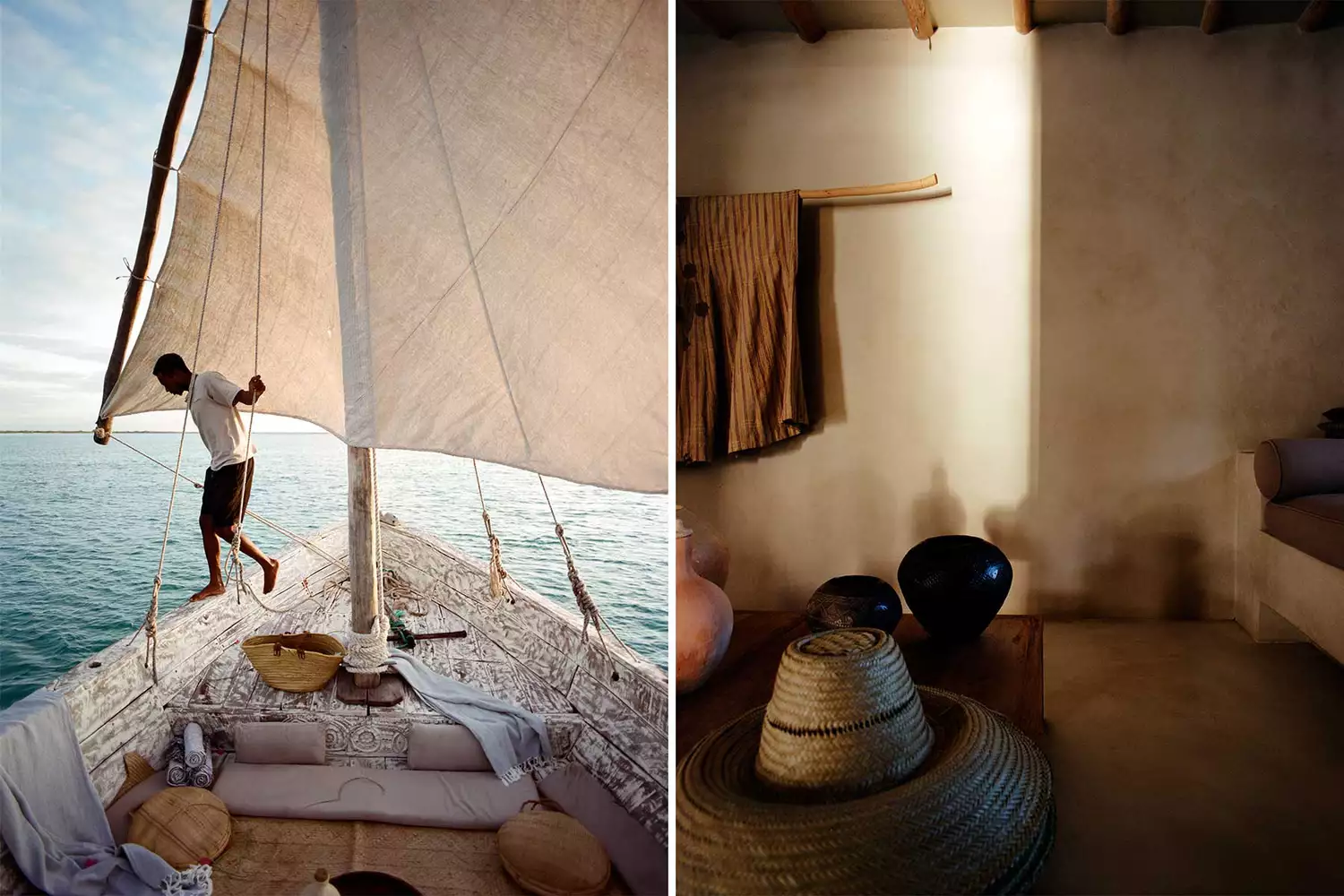
Ovals of solid gold were projected across the cabin walls as a result of the plane tilting and the sun breaking through the windows. The Bazaruto Archipelago's islands and the sea between them caught my attention as I peered down. The low tide was streaming out in 20 enticing hues of blue. A sandbar's wide expanse has broken through the shallows. My initial image was of a sculpture made of sand that was evocative of early Cubist pieces, like Picasso's "Tête de Femme (Fernande)," in which all the features of a face are seen at once, with numerous planes merging into a single face. The lines of that piercing countenance were highlighted and made more pronounced by the sea, which almost seemed to function as a shadow.
In his reflection on Venice called "Watermark," poet Joseph Brodsky stated that "I simply think that water is the image of time." My first impression of the Bazaruto Archipelago was similar to how so many cultures view the sea as a symbol of divinity, as seen in Vishnu floating on a cosmic sea and the Spirit of God moving upon the face of the oceans in Genesis. Water is the element that most accurately embodies the sense of motion, simultaneity, and calms that, deep down, we all know delivers a glimpse of the divine.
Five islands make up the Bazaruto Archipelago, which is located in southern Mozambique at the edge of the Indian Ocean. It is situated at the intersection of two wildlife "corridors," which are used by animals to migrate up and down the eastern coast of Africa, including humpback whales and blacktip and hammerhead sharks. The area's numerous weather systems also contribute to its exceptional diversity of habitats, which range from freshwater lakes to sand flats and mangrove swamps.
Although the archipelago is incredibly magnificent, it wasn't just beauty that affected me that morning. During the pandemic, I had begun to feel vulnerable. I was leaving behind a few months of solitude. My initial effort to fly there in November of last year was unsuccessful because Mozambique was one of eight African nations hindered by COVID-related travel restrictions and Omicron had hit that month.
Even though the trip had to be canceled, I fell ill when I was sitting in upstate New York. After a particularly long and severe winter, I was nearly afraid to travel. I found myself juggling the excitement of being back in the world with a new sense of precariousness as I descended south from JFK on a 15-hour United trip to Johannesburg and sailed into the Southern Hemisphere. The captivating sight of the archipelago was tinged with a hint of melancholy. I was brought back to the anxiety that nearly prevented me from leaving my house. The image of all that was fleeting and enduring lay in that translucent expanse of sea and sand underneath me, providing any necessary evidence of how amazing the world is.
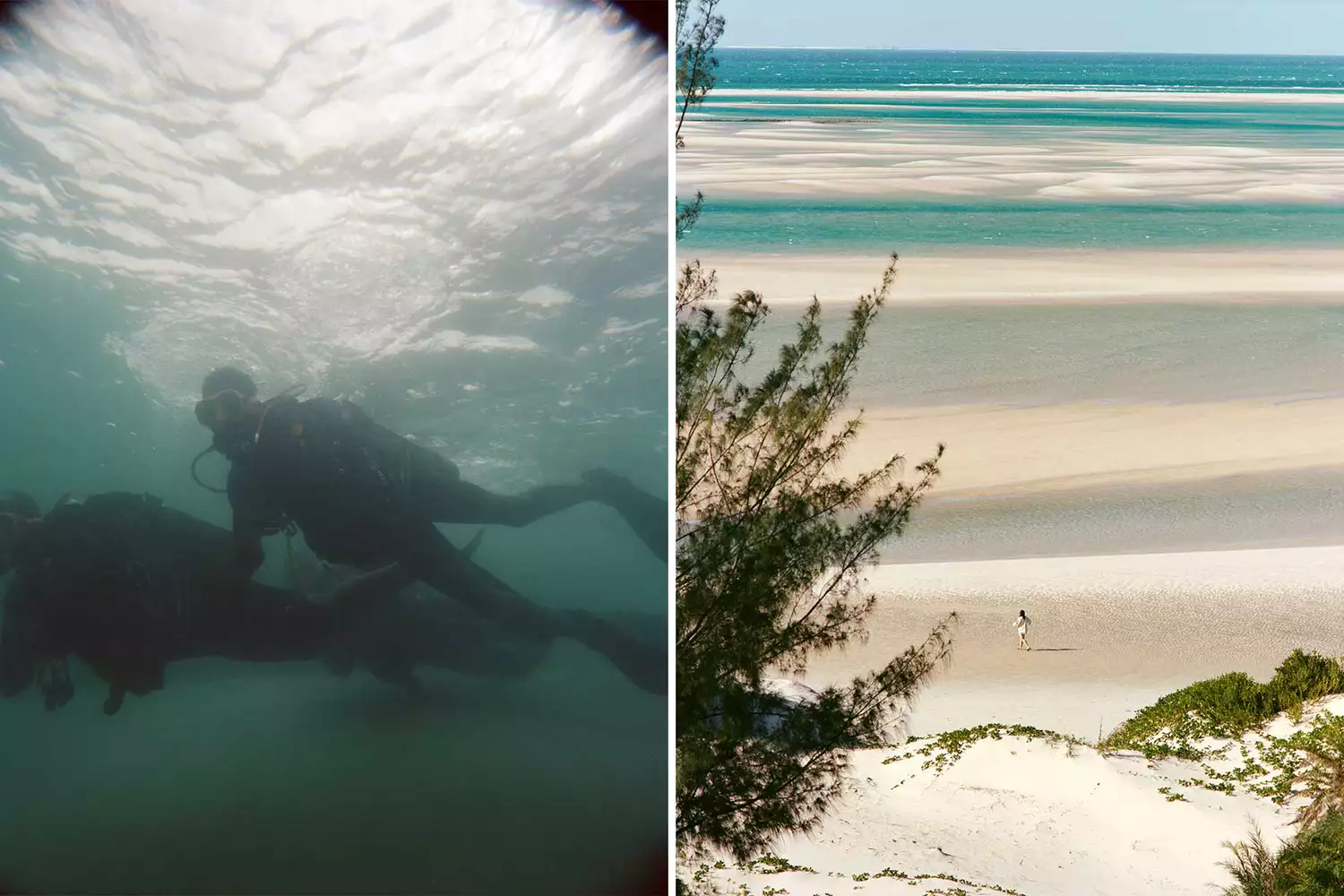
Mozambique is positioned like a drooping Y in the southeast of Africa, with its horns pointing north toward Tanzania, Malawi, and Zimbabwe, and its tail towards South Africa. Its narrow waist is divided between a largely Muslim, Swahili-speaking north and a Bantu Christian south by the Zambezi River. A 1,500-mile coastline that faces the Indian Ocean has historically made the southern Arabian Peninsula and the western coast of India feel as much a part of Mozambique's history as does the continent of Africa. Vasco da Gama was drawn to these shores in 1498 while traveling to India by sea, which had been bringing Arab traders here for a thousand years starting in the tenth century. His arrival signaled the start of the Portuguese occupation of Mozambique, which lasted uneventfully for about 500 years and was motivated by a desire for gold, ivory, and, as was so frequently the case in Africa, people to enslave.
The Bazaruto Archipelago can be reached through the seaside town of Vilankulo, which has 25,000 residents. At its tiny airport, after navigating the lengthy lines for immigration, Mario De Figueiredo, a bush pilot with a bright-red helicopter, met me. De Figueiredo showed out towns with circular buildings made of local madjeka (thatch) and caniço as he took me on a ferry between the mainland and Benguerra Island (reed). Sand roads without pavement could be seen among the dunes, pristine lakes, and lush, glossy flora of palms and fruit-bearing plants.
De Figueiredo was born and raised in Mozambique during the last decade of Portuguese control. Portugal ultimately started to give up control of some of Africa after the overthrow of dictator Antonio Salazar in 1968, even though it purposefully kept such regions impoverished. Three countries gained their independence in less than a year: Guinea-Bissau in 1974, Angola in 1975, and Mozambique in 1975, the latter at the hands of the Frelimo freedom movement, which was led by Marxists. The illiteracy rate was over 90%, the New Yorker's William Finnegan noted in his 1992 book "A Complicated War," describing the precariousness of the time. In all of Mozambique, there were fewer than a thousand Black high school graduates.
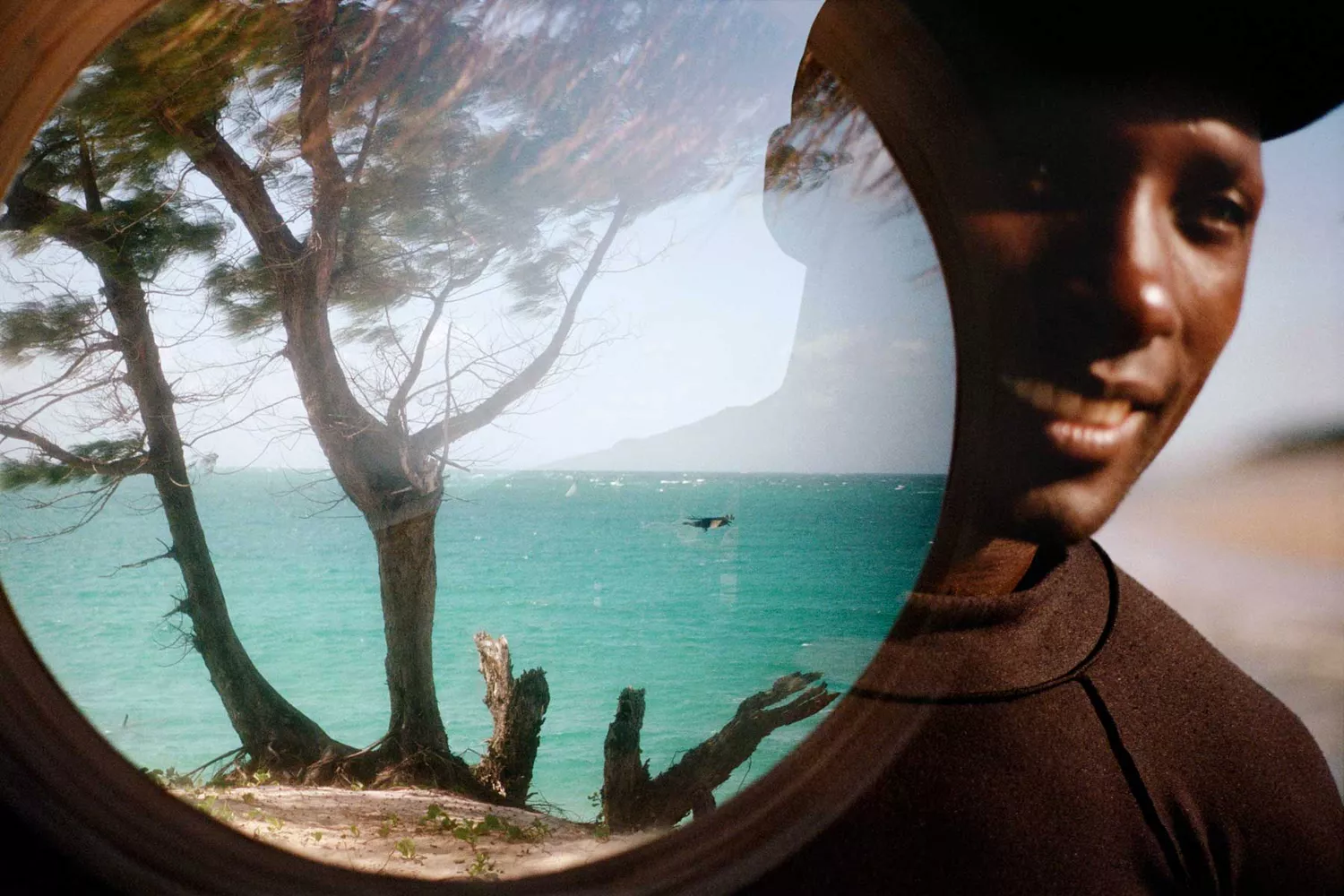
In 1974, De Figueiredo, then 14 years old, migrated to Portugal as part of a large-scale exodus of Africans of European ancestry. After only two years of relative calm, a 15-year civil war broke out in the newly independent country. It is difficult to overstate how miserable that conflict was. 4.5 million people were internally displaced, and a million people were killed. Land mines littered this lowest of destitute nations, which also possessed a brutalized populace made up of dislocates (displaced people), mutilates (amputees), and Bandidos armados (armed bandits).
The objective of Frelimo was to create the first Black Marxist state in Africa in Mozambique. Additionally, it was "the first significant defiance of colonial authority in southern Africa," according to Sayaka Funada-Classen, a researcher, who wrote about it in "The Origins of War in Mozambique." Such a state was not acceptable to the neighboring apartheid governments, especially one that offered asylum to Nelson Mandela's African National Congress. As a result of their perception that the new nation posed a grave threat, Mozambique was dragged into a horrifying proxy conflict and turned into one of the final major Cold War theatres. Against an uprising that was initially supported by Southern Rhodesia and later, once that nation became Zimbabwe in 1980, South Africa, China, and the Soviet Union backed the government. For this devastated country to experience even a semblance of peace, it needed the end of the Cold War and the fall of apartheid.

The stars at and beyond Benguerra Island that night were reversed. The Southern Cross, Hydra, and Carina constellations, which are exclusively visible south of the equator, were seen in the sky that James Joyce once referred to as a "heaven tree of wet nightblue fruit." Before dinner, I gathered with the photographer for this article, Michael Turek, and a small group of other visitors beside a fire on the beach to hear De Figueiredo's tales. He wished to go back to his own country after being forced to leave it as a youth. He returned to southern Africa twenty-four years later, during the height of his midlife crisis, and eventually began his pilot training.
There were reports of unrest in the north once more, which led to the closure of one of andBeyond's resorts near Vamizi. De Figueiredo responded, "It's about money," when I questioned him about it. The hard-won peace in Mozambique was in danger due to the discoveries of rubies, gold, and natural gas, but from this beach in a nation twice the size of California, the threat seemed far and abstract.
I rediscover my love of the sea in Mozambique. I was still buzzing from my first dive in fifteen years when I met Tessa Hempson, lead scientist and program manager of the environmental group Oceans Without Borders. I glided over the seafloor after relearning the magical arts of equalizing, inhaling, and obtaining neutral buoyancy. I initially observed the brain coral's coils of cerebral tissue before noticing orange harlequin fish darting in and out of stubby-fingered digitate coral. Underneath me, are leathery sea anemones with several tendrils fanning out to reveal their vivid purple interiors.
Further along, chocolate dip damselfish were hosting a distinct kind of party with a strict black-and-white attire requirement. Following the laws of their fraternity, they scurried about in white ties and tails up and over the gnarled basin of a plate coral. Being a scuba diver is the equivalent of being the worst kind of gate-crasher: garish, nosy, and brimming with entitlement. The water life is icily contemptuous. They adamantly refuse to even acknowledge you and call attention to your poor manners by asking you to leave.
Hempson told me that she had spent the morning rolling hammerhead sharks onto their backs. She refers to herself as a "bush kid," having grown up in a region between Johannesburg and Maputo where she was surrounded by nature. I had heard that flipping the animals over made them docile, but I dismissed this as an urban myth. Hempson attested to its veracity. I inquired, "What's that called?" to her. She answered with ease, "A tonic state, like gin and tonic." When the sharks are happy swimming around her, she puts telemetric devices in their stomachs.
Hempson's day's research includes tracking apex predators, keeping track of beach erosion, and recording seascapes to capture anything from human noise to whale singing. Instilling her love of the water in those she refers to as "stakeholders" is the more difficult component of her work. These people include the locals, for whom fish and other marine life are occasionally their sole supply of eatable protein, as well as the wealthy and powerful individuals who can afford to take a holiday at one of the resorts in Benguerra. The archipelago was just named a "hope spot" by Mission Blue, the environmental organization founded by renowned American oceanographer Sylvia Earle. It is one of a select number of "unique sites that are vital to the health of the ocean."

A resort-like andBeyond is essential for Hempson. She went on to say that the resort has been a pioneer on the island in terms of people. It contributed to the construction of the community center, church, clinic, school, and clinic. Clean water is now simple to obtain and transport thanks to its Hippo Water Rollers, and plastic canisters with handles. The business offers skill development programs and involves the neighborhood in conservation efforts and environmental education.
With its lengthy lease in the archipelago, andBeyond provides more than just a starting point for Hempson's fieldwork on the environmental front. Additionally, it can encourage luxury travel that is motivated by impact, which might have a major impact on policy. She explained to me that to influence behavior, you must connect with people emotionally. The United Nations refers to Hempson's work, which she conducts in conjunction with the Africa Foundation, as "intersectoral collaboration," which is essential, according to the UN, to the accomplishment of its sustainable development goals.
Hempson almost fell out of her chair when I told her I had seen a dugong that morning after my dive, its sleek, bent body catching the sun and its whiskered snout sniffing this way and that. She remarked, "That's unbelievable." "It's difficult to convey to folks just how priceless that is," Hempson claimed that before moving to Bazaruto, she had only ever seen three dugongs. Up until about 50 of the animals appeared in the archipelago, they were all but thought to be extinct. We did not anticipate there to be thus many survivors along the entire African coast, let alone in one location.
Kisawa! Long before I entered the opulent new resort bearing the same name on the southern tip of Benguerra Island, the phrase had taken on a certain air of mystery and enchantment. The word had been repeated at andBeyond's Dhow Bar in a reverent stillness. A Bulgarian lawyer spoke fondly of its enormous 1,600-square-foot homes but quickly brushed aside the necessity for such opulent residences. We can't afford it, honey," a South African builder stated to his wife, pointing to the hotel's $5,000 per night cost, between beers and Bitcoin chatter. Working-class people here! The name "Kisawa" means "unbreakable" in Tswana, the language of the island, so when I was picked up at andBeyond, it felt as though I was being transported to the Ritz, such as its renowned prestige.
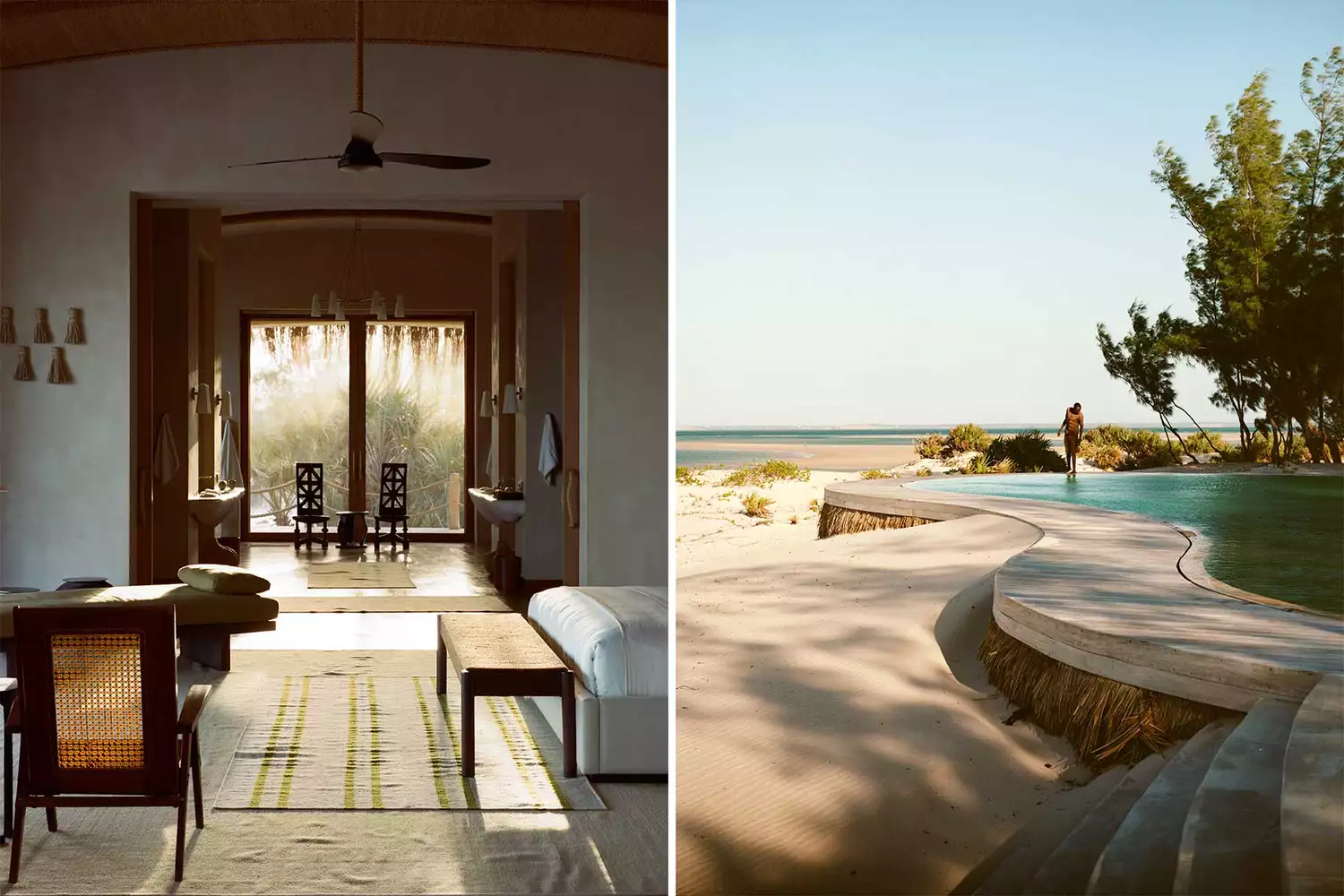
Benguerra Island, like Caliban's Isle, had been developing magically each day and was now "full of noises, sounds, and beautiful airs, that give happiness, and hurt not." The bandanna-clad Q (short for Querino) Lucas Huo, who serves as Kisawa's manager of marine, activities, and community interaction, drove me to Kisawa. He made several stops along the way to point out herds of sun is, tiny antelopes that snuck through the underbrush and cast wary glances in our direction. We went by trees covered in masala (monkey orange) and macaque, which the islanders use to produce a type of beer. Q forced me to sample the fruit. It was pitted and deliciously tart, like Asian mangosteen.
All morning, a low, bruised sky had lingered over us; just as Kisawa's villas emerged, it started to rain. A favor, Q replied. The sea sank back for acres in alluring bands of blue, framing the houses' tall roofs of serried Modjeska.
The butler that each bungalow comes with, the private pools, and the enfilade of rooms divided by large sliding doors dressed in a local matting called Pesqueira are just a few of the things I would mention if I were to describe Kisawa in the language of tourism or, for that matter, in the language of my fellow travelers at the Dhow Bar. I would discuss the furniture from all over Africa, the long, turmeric-colored sofas, the oak and rattan chairs from Cameroon, and the bulb-shaped baskets from Nigeria. I would bring up the cobalt-eyed chef Joseph Moubayed, who combines the influences of his Lebanese, Senegalese, and French backgrounds to produce food that was so delicate and subtly flavored that I was left wondering where the flavors originated. (Was that crab with matapa, a regional meal created by combining coconut milk and boiled cassava leaves? Or muhammara flavored with the native fruit tinziva, which is a relative of tamarind and has a tart juice? Did he just add monkey orange to the ceviche to give it that agonizing sourness in the back of the mouth?) The impression I got every evening at Kisawa as I drove my villa's specialized electric Moke to the main terrace and arrived there along winding roads with silvered views of the sea and the twinkling of other villas in the distance could never be adequately described in words. Restaurants that were lit only by torches were where Moubayed was preparing curried lamb shank and fish pastels.

A tape of André Marie Tala, the musical genius from Cameroon, was playing in the terrazzo-floored pub with porthole windows and vaulted ceilings, conjuring up the tragic optimism I've always associated with the postcolonial world's early years of freedom. It is music that holds the promise of fresh starts at a time when expectations for independence and autonomy hadn't yet been shattered by sectarian conflict and civil war.
It's like asking a new house to feel lived in to expect a new hotel to capture the ambiance of the past. However, Kisawa does just that, and it is at the core of the air of carefree chic the location radiates. After recently marrying the youngest son of King Constantine, Nina Flohr, the VistaJet heiress who is now also the Princess of Greece and Denmark, founded Kisawa. The resort is a testament to Flohr's active involvement, from the handcrafted Moubayed menus to the decorative accents like the record player and carefully chosen vinyl collection I discovered in my room.
Flohr is also in charge of the Bazaruto Center for Scientific Studies, which Kisawa founded and is still funding. Mario Lebrato, station manager and BCSS chief scientist, said, "Nina seeded it and pushed it." "This is a super hot spot for migratory animals," he said, describing the archipelago as a marine "crossroads," Liberato stated that the BCSS promotes conservation through the collection of data, which is made available to everyone, including the Ministry of the Sea of Mozambique as well as regional universities, students, and researchers. Liberato added, holding a hydrophone he had been using to record ocean noises, "We regard it as study, but that has a conservation value."
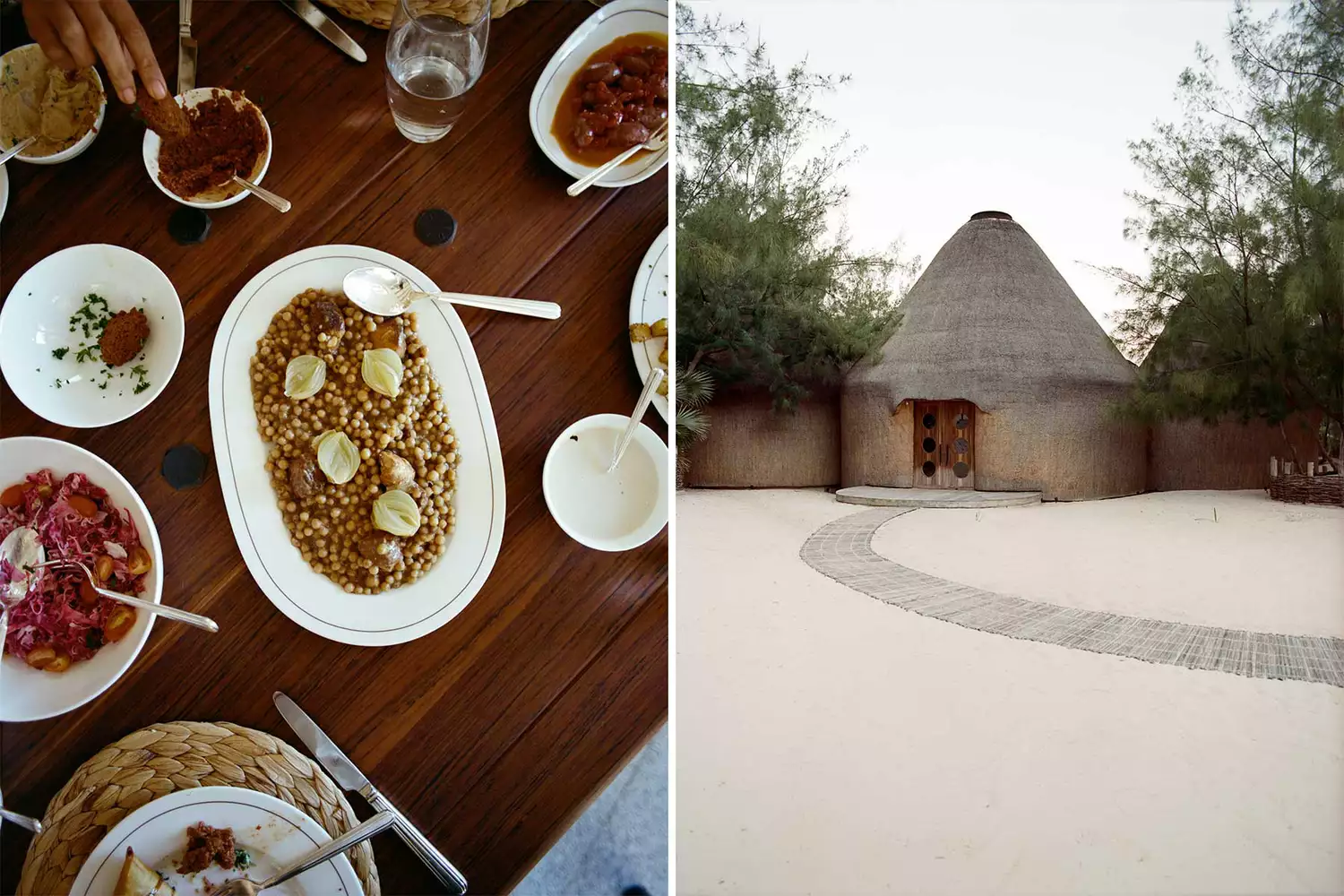
I already consider some of the times I spent at Kisawa to be among the happiest of my life. Maybe it was the time I had just returned from a deep dive and had witnessed blacktip reef sharks circling menacingly above the coral, chilling the seafloor. Piebald-faced loggerhead turtles swam up into the raking shafts of plankton-filled light. After that, a soft marine light filled a bathroom the size of my flat that had high-backed Tanzanian ebony chairs and a bathtub that resembled a cracked dinosaur egg. Beyond were dune fields covered with beach morning glory purple. By the sea, I was by myself. I didn't have to will myself into this luxury. It came from the location itself, and I could feel it in every cell of my body.
Only Mozambique has a modern weapon depicted on its flag. The sight of that AK-47 outside a government building in Vilankulo, framed by a yellow star on a red background, served as a reminder of the terrible violence its citizens had to endure. I had spoken to Isac Paulo Nhamirre, a big man with the restrained manner of a soldier, on my first full day in Mozambique. He explained his role as a bridge between the local people, the government, and hotels and resorts. He could vividly recall how, at the age of 18, he had been in school, eating his lunch, when government recruiters showed up and coerced him into enlisting in the army. It was 2:25 p.m.
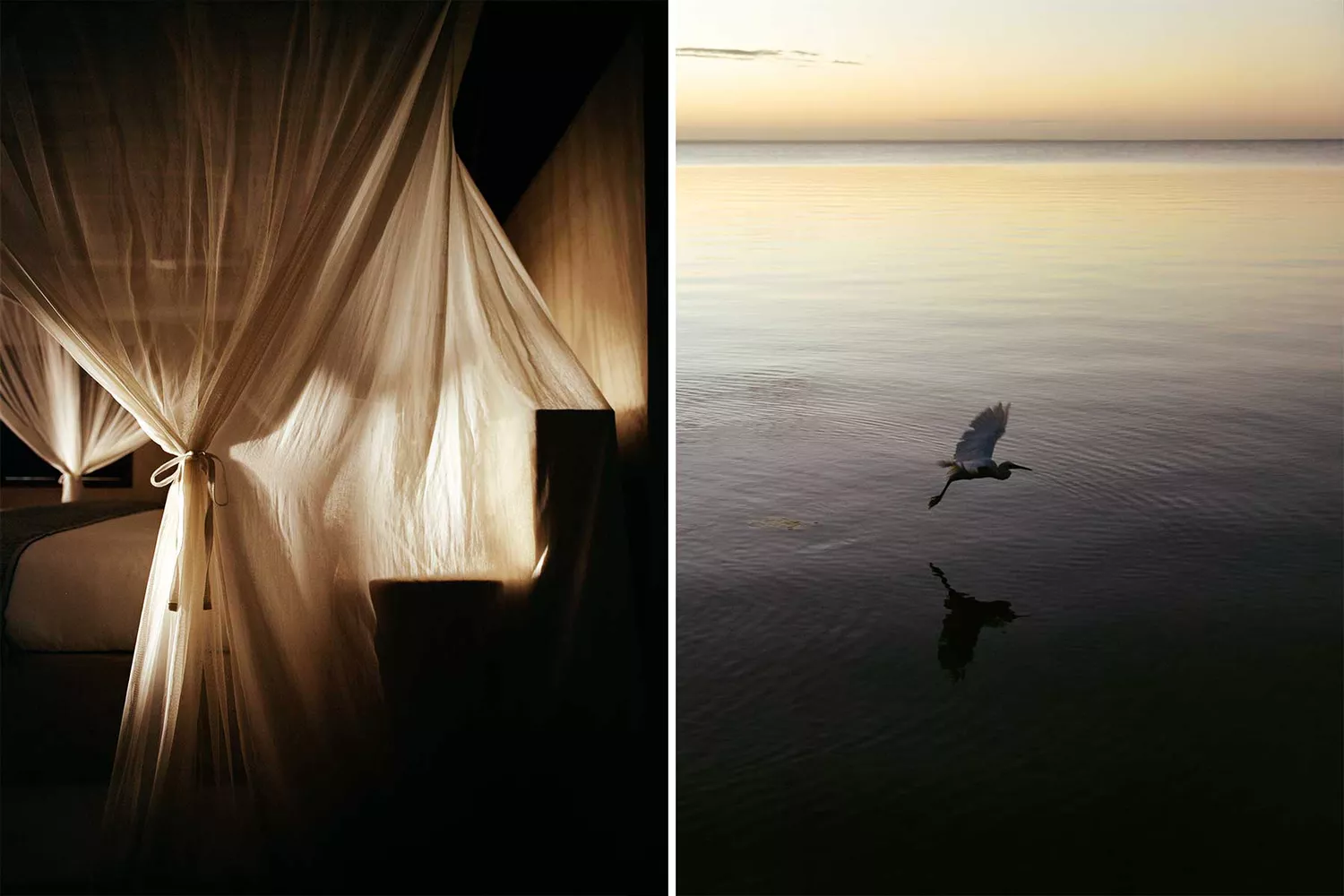
They said, "You stand up, you stand up, you follow us." He recalls that they gave him paperwork to sign. They stopped by his home to inform his parents that he was enlisting. That I wouldn't be turning around, he said. Because of his late start to school due to the war, he was only in the eighth grade when he realized "that this lovely moment" was over. Shamir, who is now 37, continued to serve there. He recalled a world where 12- and 13-year-old child soldiers had been taught to kill without thinking, saying, "It wasn't a good place to be." "It was awful."
I spent the morning of my final full day in Mozambique talking to men who had lived through the war at Sussurro, a boutique hotel on the mainland with views of Govuro lagoon, about 55 miles north of Vilankulo. Without Wi-Fi or air conditioning, Sussurro is a place of austere beauty where long afternoons are spent reading and wearing mosquito nets. In part, because I felt the need to keep in mind the lived experiences of those around me amidst all this breathtaking natural beauty, I had asked Nick Taylor, the Zimbabwean manager of the hotel, to assist in setting up a conversation with veterans of the war. I didn't say the word out loud until Taylor inquired about what I was writing about, perhaps taken aback by my request. “Fragility.
I came to understand that it was how I had been feeling all along. The war in Ukraine had taught us anew to appreciate the frailty of peace, both in Mozambique and now in the rest of the world. Environmental fragility existed as well, manifested in the delicate sea balance that Hempson and Lebrato were working so arduously to protect. If the pandemic hadn't shattered another kind of fragility related to our way of life, none of this would have been apparent to me. We believed that the current of our contemporary life could not be stopped. But it had proved more brittle than we could ever have expected.
The tide had gone out again. There is a brief window of time when it is safe to travel by car along the beach from Sussurro to Vilankulo airport. Soon, we were driving a blue Mazda pickup truck quickly over the wet sand. On my left was the ocean, and on my right was a red earth embankment that was studded with shredded palm fronds, fishing nets, and boat debris.
The sea reminds us of our mammalian urge to breathe. The dugong can stay underwater for a time, but what makes it like us on the most primitive level, separating it from the monsters of cold blood and scales, is that it must ultimately come up for air. In both literal and metaphorical senses, this past week in Mozambique had also been a sort of surfacing. It had given me back my sense of wonder and curiosity. A familiar restlessness and joy had come back, reminding me of the purpose of going out into the world in the first place. I was able to shake off the fears the pandemic had caused by learning how to breathe once more.
Where to Stay Outside of Benguerra Island: The Bazaruto Archipelago National Park is home to villas that are ideal for a honeymoon, but the real draws are the wildlife experts, scuba diving excursions, and sailing on a dhow.
Kawa: The accommodations at this resort on Benguerra Island have an award-winning design thanks to the use of sustainable materials like woven local grasses. Each bungalow has a butler, a private pool, and an acre of land all to itself.
Sussurro: This boutique property, which opened in 2021 on the mainland’s Nhamabue Peninsula, is supported by renewable energy and local fishing and farming.”

